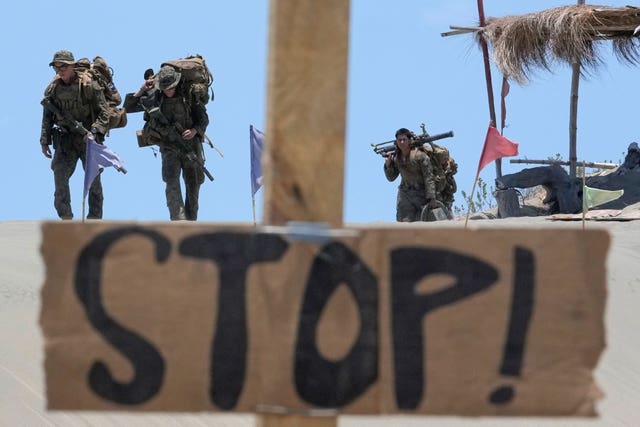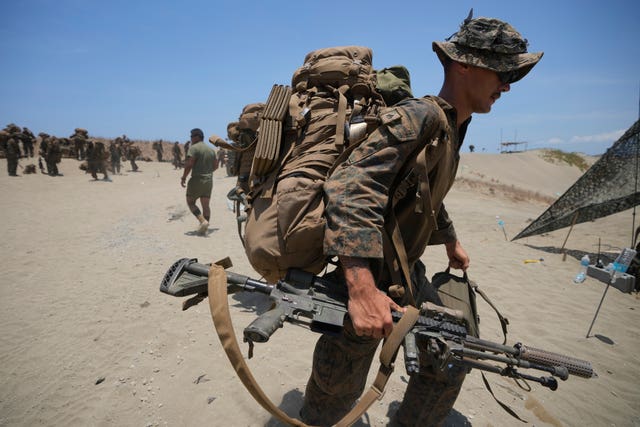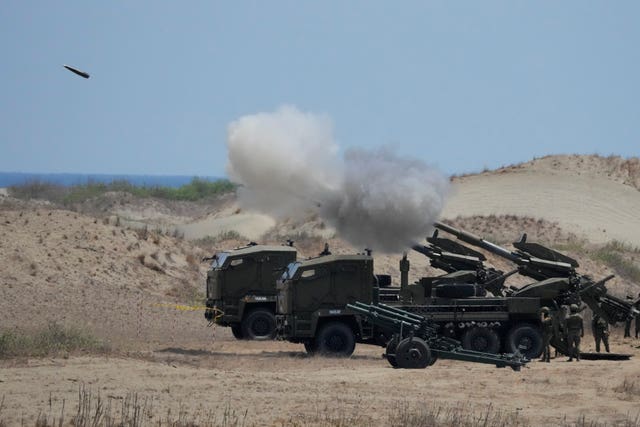US and Philippine forces sink ship during drills in disputed South China Sea
Military officials and diplomats from several countries watched the display of firepower from a hilltop along the coast of Laoag City.

US and Philippine forces, backed by an Australian air force surveillance aircraft, unleashed a barrage of high-precision rockets, artillery fire and airstrikes on Wednesday – sinking a mock enemy ship as part of largescale war drills in and near the disputed South China Sea that have antagonised Beijing.
Military officials and diplomats from several countries watched the display of firepower from a hilltop along a sandy coast in Laoag City in Ilocos Norte, Philippine President Ferdinand Marcos Jr.’s northern home province, on Wednesday.
More than 16,000 military personnel from the US and the Philippines, along with a few hundred Australian troops and military observers from 14 countries, were participating in annual combat-readiness drills.

The drills, which started on April 22 and end Friday, include a scenario of a foreign invasion of the Philippine archipelago.
It is the latest indication of how the US and the Philippines have bolstered a defence treaty alliance that started in the 1950s amid their concern in recent years over China’s increasingly aggressive actions in disputed territories in Asia.
Mr Marcos has ordered his military to shift its focus to external defence from decades-long domestic anti-insurgency operations as China’s actions in the South China Sea become a top concern.
That strategic shift dovetails with the efforts of US President Joe Biden and his administration to reinforce an arc of alliances in the Indo-Pacific region to counter China.
China has angered the Philippines by repeatedly harassing its navy and coast guard ships with powerful water cannons and a military-grade laser, blocking movements and other dangerous manoeuvres in the high seas near two disputed South China Sea shoals.
They have led to minor collisions that have injured several Filipino navy personnel and damaged supply boats.

“We’re under the gun,” Philippine Ambassador to Washington Jose Romualdez told The Associated Press in a telephone interview.
“We don’t have the wherewithal to be able to fight all of this bullying coming from China so where else will we go?” Mr Romualdez added.
“We went to the right party, which is the United States and those that believe in what the US is doing.”
China has accused the Philippines of setting off the hostilities in the disputed waters by encroaching in what it says are its offshore territories, demarcated by 10 dashes on a map.
It says the Chinese coast guard and navy have been forced to take action to expel Philippine coast guard and other vessels from those areas.
The Philippines has repeatedly cited a 2016 international arbitration ruling based on the United Nations Convention of the Law of the Sea that invalidated China’s claim over virtually the entire South China Sea on historical grounds.

China did not participate in the arbitration complaint filed by the Philippines in 2013, and has rejected the ruling and continues to defy it.
After being hit repeatedly by missile and artillery fire and bombs dropped by US and Philippine warplanes during the combat drills, the mock enemy ship sank as black smoke billowed from its stern.
The target ship was made in China but decommissioned by the Philippine navy in 2020 due to mechanical and electrical issues, according to the Philippine military.
Philippine military officials said the drills were not directed at any country.
China has opposed military drills involving US forces as well as increasing US military deployments in the region, which it warned would escalate tensions and endanger regional stability.





